How To Deal With Uncooperative Co-Workers
Teammates who ignore you or refuse to help can get in the way of your whole company’s success. Here’s what you can do.
In support, you’re on the front lines of the business, doing everything that you can to make your customers happy.
But you can’t do it on your own.
Often, it takes the help of others on your team to deliver great customer service. In a software business, you might be calling on developers to look into bugs or alter a customer’s account. In e-commerce, you may need your warehouse team to confirm product availability. In any business, you’ll sometimes have to go to other team members or departments for help.
And that’s okay, because customer support should be a priority for the entire company.
But what happens when someone on your team isn’t being as helpful as you’d hope?
What if they ignore your emails, or consistently take a long time to respond, making it harder for you to keep your customers happy?
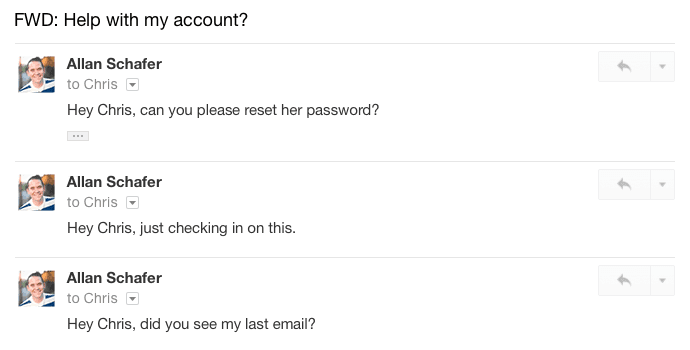
Fear not. You can turn this situation around.
And today, I’m going to show you how.
Note: 8,000+ companies use Groove to delight customers with fast, personal support at scale. All without breaking the bank. Start your free 7-day trial today! (No credit card required)
Cooperation Is in the Eye of the Beholder
I used the word “uncooperative” in the title because that’s a word several people have used when asking me about this issue.
But that’s not a productive way to think.
Because what you see as being uncooperative, the other person may have a far different view of.
If your job – and the only thing you’re evaluated, and given promotions on – is to do x (e.g., development), then you’re going to make damn sure that you hit all of your goals for x before you spend time helping other people do their jobs (e.g., support).
Rather than seeing themselves as uncooperative, they may simply give your request a lower level of importance than the other things on their plate.
And the hard truth is that they’re not necessarily wrong: our own problems are always the most important problems to us.
Which is why the best way to get people to help solve your problems is to help them see why doing so can help them win, too.
What’s in It for Them?
You already know that empathy is the single most important customer service skill.
Being able to feel how your customers feel is the only way you can truly understand how to make them happy and achieve what they want.
Working with your teammates is no different.
Rather than expecting people to give you what you want, start by understanding what they want. Helping them get that is the best way to get what you* *want from them.
In a perfect world, the entire team would be incentivized by management to help the support team ensure that customers are happy, and even to do support themselves.
But most of us don’t live in a perfect world, and it’s on us to make others want to help us.
Personally I am very fond of strawberries and cream, but I have found that for some strange reason, fish prefer worms. So when I went fishing, I didn’t think about what I wanted. I thought about what they wanted. I didn’t bait the hook with strawberries and cream. Rather, I dangled a worm or grasshopper in front of the fish and said: “Wouldn’t you like to have that?”- Dale Carnegie
Think you don’t have any “worms” that your co-workers will find valuable?
Think again. Here are just a few of the ways you can make your teammates want to help you:
Make them feel important.
While you get emails from customers all day, it’s easy to forget that many of your teammates rarely get to hear from the people that their work makes an impact on.
We all feel good when we see how important our work actually is.
As the gatekeeper of customer feedback, you have a change – a responsibility, even – to show your teammates how much of an impact their work has.

Make them feel appreciated.
In the fast-paced world that most of us live and work in, it’s easy to forget the incredible power of a simple (and most importantly, heartfelt) “thank you.”
Think back to the last time someone singled you out and truly showed you gratitude for something you did?
Think about how good that felt.
Now think about passing that feeling along to the people on your team the next time they do something for you.
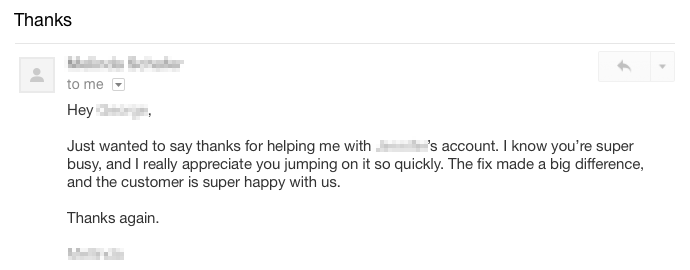
By the way, this isn’t “fluff.” The power of gratitude is actually backed by science.
In 2010, researchers from the Universities of Pennsylvania and North Carolina set out to study the impact of gratitude on people’s behavior.
Participants were asked to give feedback on a fictional student’s (“Eric”) cover letter. After the feedback was received, the participants got a reply asking for feedback on a second cover letter.
Half of the participants got a straight, to-the-point email with the second request, while the other half got an email expressing gratitude for completing the first review.
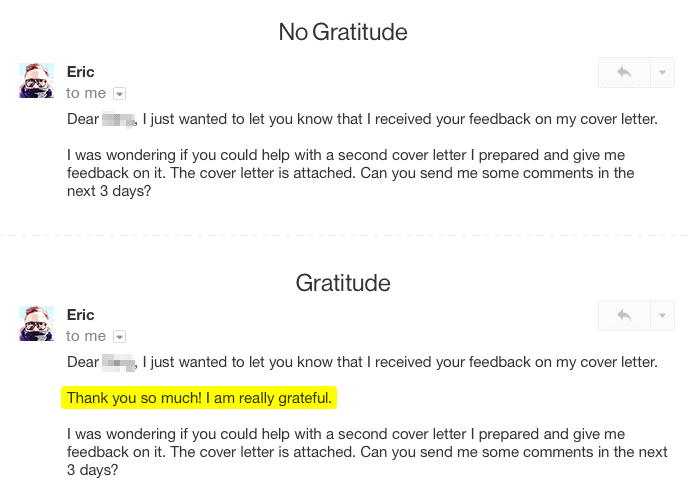
The results?
32% of the “No Gratitude” group provided feedback on the second cover letter, while 66% of the “Gratitude” group sent more feedback.
Gratitude more than doubled the response rate.
Make them look good to their boss.
Making people feel important and appreciated is incredibly powerful. But you can also help your teammates get ahead in their careers, simply by making them look good in front of the rest of the team.
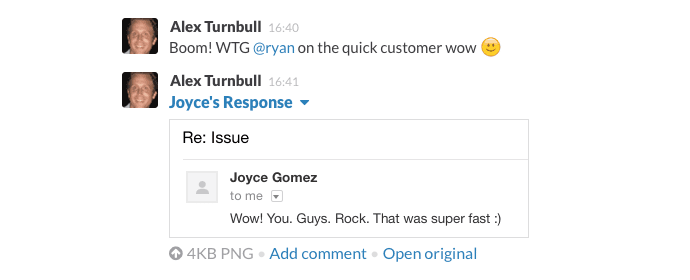
A simple shout-out in the team chat room, or an email with the teammate’s manager CC’ed, can often be enough to activate the impressive power of reciprocity in getting people to help you.
Asking for What You Want (The Right Way)
If you’re doing all of the right things to make your teammates want to help you and still not getting the results you want, you may simply be asking the wrong way.
Let’s say you send this email:

And 24 hours later, you still have no response.
Who’s fault is that?
Well, partially yours.
When asking for help, keeping a simple rule in mind can make your life a whole lot easier:
Don’t expect to get anything you didn’t ask for.
Be specific with what you want and when you want it. It’s possible to be direct without looking demanding and difficult:
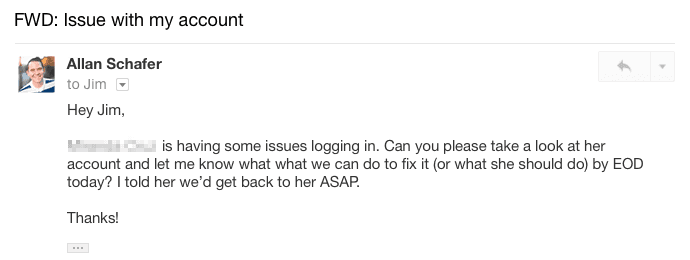
Practicing directness is a simple, but powerful way to start getting what you actually want a lot more often.
If All Else Fails
If you follow the tips in this post, you’ll be ahead of 99% of those who complain about their uncooperative teammates, and your problem will likely be solved.
It’s much more rare that people are truly too difficult to work with. Often, it’s simply a case of neglecting to exercise empathy and do what it takes to align your interests.
But those people – those who will ignore your requests and actively refuse to help, despite your best efforts – do exist.
And there comes a point when you need to go over their heads.
If someone refuses to help you because it isn’t “their job,” then work to make it their job.
If the management of your company understands the massive ROI of customer support, then they’ll understand why your problem is an important one.
Check out my guide on changing company culture from within. By bringing management around the idea that everyone should contribute to support, you incentivize your teammates to do what needs to be done to keep your customers happy.
Start With Honey, Not Vinegar
Most of us, when we feel like we’re being wronged, gravitate toward intense negative feelings of frustration or anger.
Acting out on that anger only makes us enemies, and ends up hurting us.
One of the most important skills that can help you get what you want from others (and get ahead in life) is the ability to understand people’s needs and align their interests with yours.
As a customer service professional, you’ve been honing that skill for some time now with your customers.
But it can be just as valuable to achieve success among the people you work with.
Note: Is your business growing? Groove’s Shared Inbox, Knowledge Base, and reporting can help you delight customers with fast, personal support at scale—without breaking the bank.Sign up for a 7-day trial today! (No credit card required)